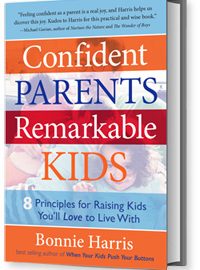
Getting Choices to Work
Q. What is the next step after saying, “You can either pick up that toy you threw and put it in the box or hand it to me. Which do you choose?” and the child refuses to choose or states they refuse to do either? I frequently find this with my 3 year old daughter. We either end up in a power struggle or I end up letting it go and the toy is left or I pick it up.
A. I would add, “If you can’t make the choice right now, let’s take a break and do something else and then come back to it.” If you put it to her the moment she has thrown the toy it is too soon because she is deep in her anger. Next time give it time for her emotions and yours to calm. I might also start with “Do you want to…” instead of “You can either…” which sounds a little more threatening. If your anger is behind your words, she will definitely not respond. Take a












